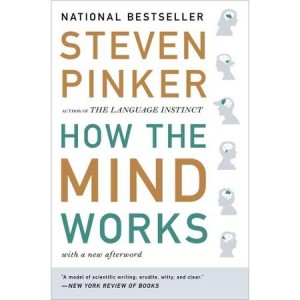 Why is reading, at least for me, so soothing, stimulating and confusing, all at the same time? Why does my mind react so strangely at times to what I am reading?
Why is reading, at least for me, so soothing, stimulating and confusing, all at the same time? Why does my mind react so strangely at times to what I am reading?
Four years ago, I tried Steven Pinker’s monumental (some 800 pages of small type!) suggestion that we humans are actually becoming less violent, in The Better Angels of Our Nature. So it was only natural that I stepped back in time to read How The Mind Works, his equally long tome of 1997, updated to 2009, describing the innumerable quirks and ramblings that emanate from inside our heads.
A noted professor of psychology at Harvard University, Dr. Pinker attempts, and succeeds, I think, in synthesizing, “An emerging view of human nature,” one replete with frequent humor, quotations from numerous other sages (ranging from Plato and Pascal, to Bierce and Mencken, including Monty Python, Peanuts and Woody Allen!), and solid scientific evidence.
But he begins on a “note of humility,” saying, “We don’t understand how the mind works and I have not discovered what we do know about how the mind works.”
He cautions, “… our minds are not animated by some godly vapor or single wonder principle.” We do know, “the mind is a product of the brain and the brain is a product of evolution.” That leads him to “the central idea … that the mind is a system or naturally selected organs of computation.” He notes, “We increasingly understand ourselves in terms of the inner workings of our minds, their origins in the natural world, and their interplay with the contents of culture and civilization.”
Pinker explains further: “The mind is a system of organs of computation, designed by natural selection to solve the kinds of problems our ancestors faced in their foraging way of life; in particular, understanding and outmaneuvering objects, animals, plants and other people.”
Many of his succinct “definitions” made me come to a complete halt, frequently with a laugh, followed by serious reflection:
The tongue: “a boneless water balloon, controlled by squeezing.”
The computer: “the most legalistic, persnickety, hard-nosed, unforgiving demander of precision and explicitness in the universe.” (Could a computer actually become a “thinking machine?”)
Life: “a series of deadlines”
Winter: “the best insecticide”
Our brains: “… take up only two percent of our body weight but consume 20 percent of our energy and nutrients.”
Information: “… the one commodity that can be given away and kept at the same time.”
Mathematics: “… ruthlessly cumulative.”
The stock market: “a large industry of self-appointed seers hallucinating trends in the random walk of the stock market.”
Jewish dietary laws: “Talmudic sophistry and bafflegab”
Status: “the public knowledge that you possess assets that would allow you to help others if you wished to.” (But Pinker notes that these “assets” must be conspicuous to be of any use …)
Music: “an enigma – a cocktail of recreational drugs that we ingest through the ear to stimulate a mass of pleasure circuits at once.”
And humor: “an anti-dominance poison, a dignicide.”
But “problems continue to baffle the modern mind: consciousness in the sense of sentience, the self, free will, knowledge, and morality.” Pinker suggests that you “step outside your own mind for a moment and see your thoughts and feelings as magnificent contrivances of the natural world rather than as the only way that things could be.”
And comments in conclusion, “Our bafflement at the mysteries of the ages may have been the price we paid for a combinatorial mind that opened up a world of words and sentences, of theories and equations, of poems and melodies, of jokes and stories, the very things that make a mind worth having.”
We human beings, surmounting by our minds, are extraordinary, complex and yet strange adaptations.
What a read!
Editor’s Note: ‘How The Mind Works,’ by Steven Pinker is published by W. W. Norton, New York 2009.
 About the author: Felix Kloman is a sailor, rower, husband, father, grandfather, retired management consultant and, above all, a curious reader and writer. He’s explored how we as human beings and organizations respond to ever-present uncertainty in two books, ‘Mumpsimus Revisited’ (2005) and ‘The Fantods of Risk’ (2008). A 20-year resident of Lyme, he now writes book reviews, mostly of non-fiction that explores our minds, our behavior, our politics and our history. But he does throw in a novel here and there. For more than 50 years, he’s put together the 17 syllables that comprise haiku, the traditional Japanese poetry, and now serves as the self-appointed “poet laureate” of Ashlawn Farms Coffee, where he may be seen on Friday mornings. His wife, Ann, is also a writer, but of mystery novels, all of which begin in a bubbling village in midcoast Maine, strangely reminiscent of the town she and her husband visit every summer.
About the author: Felix Kloman is a sailor, rower, husband, father, grandfather, retired management consultant and, above all, a curious reader and writer. He’s explored how we as human beings and organizations respond to ever-present uncertainty in two books, ‘Mumpsimus Revisited’ (2005) and ‘The Fantods of Risk’ (2008). A 20-year resident of Lyme, he now writes book reviews, mostly of non-fiction that explores our minds, our behavior, our politics and our history. But he does throw in a novel here and there. For more than 50 years, he’s put together the 17 syllables that comprise haiku, the traditional Japanese poetry, and now serves as the self-appointed “poet laureate” of Ashlawn Farms Coffee, where he may be seen on Friday mornings. His wife, Ann, is also a writer, but of mystery novels, all of which begin in a bubbling village in midcoast Maine, strangely reminiscent of the town she and her husband visit every summer.